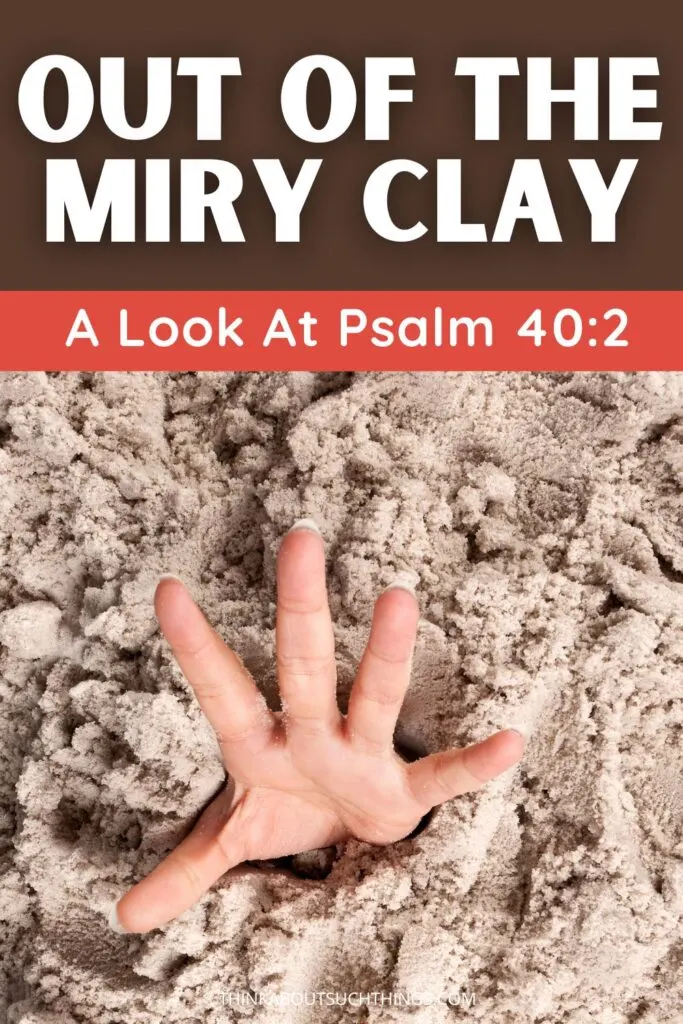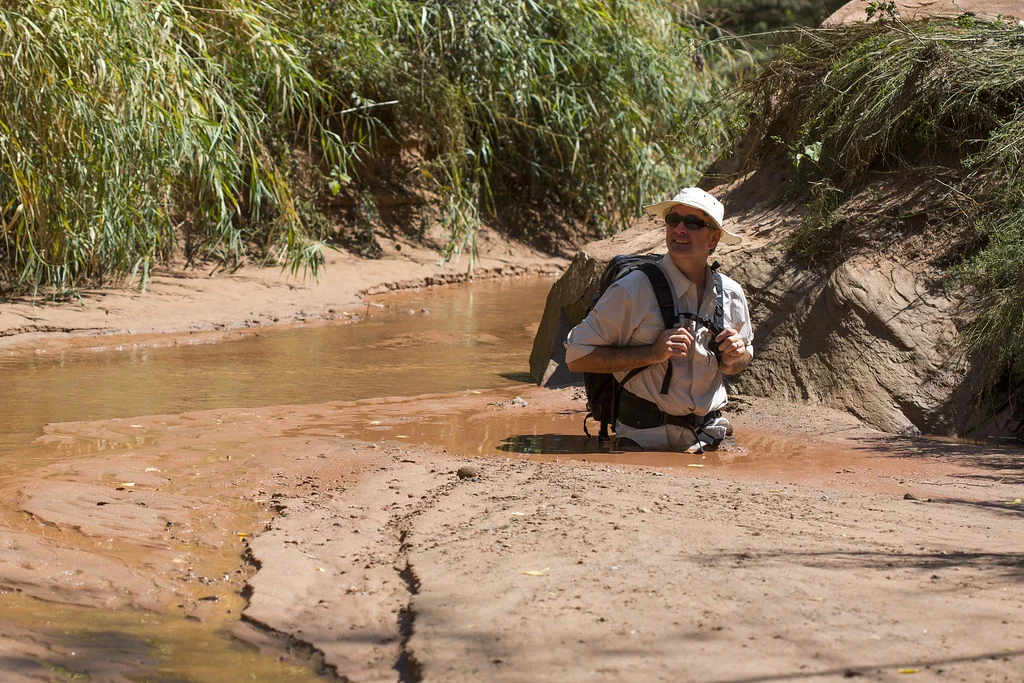In this article, we will dive into Psalm 40:2 and see what it means for God to take us out of the miry clay. So, grab your Bible, and let’s learn…
The Bible is full of phrases and words that are poetic, prophetic, and powerful wisdom for our daily lives.
Unfortunately, many words’ original meanings and intentions can get lost in translation or watered down due to the passage of time. The Psalms, in particular, are full of such phrases and statements.
One example is Psalm 40:2, which says,
“He brought me up also out of a horrible pit, out of the miry clay, and set my feet upon a rock, and established my goings.”
What does this verse refer to?
What is “miry clay,” and what does it mean for modern believers?
Let’s answer these questions and more!

What Is Miry Clay?
Miry clay isn’t something that modern humans are very familiar with unless we live in certain regions, so most of us read over this verse with only a vague idea of what it means. We know that clay is sticky, but that’s about it.
So, what is miry clay?
Though the King James Version translates it as “miry clay,” other translations are slightly more descriptive, at least for modern readers.
The ESV calls it a “miry bog,” while the NIV and NLT refer to “mud and mire.”
The Hebrew words are:
- Miry: “Yaven” : It means dregs, effervescing, or mud.
יָוֵן yâvên, yaw-ven’; from the same as H3196; properly, dregs (as effervescing); hence, mud:—mire, miry. - Clay: “Tiyt” : It refers to something sticky, like mud or clay.
טִיט ṭîyṭ, teet; from an unused root meaning apparently to be sticky (rather perhaps a demonstrative); from H2894, through the idea of dirt to be swept away); mud or clay; figuratively, calamity:—clay, dirt, mire.
The symbolism is like quicksand, hence the use of the word “bog” in the ESV.
I know most of us have never seen or experienced the sensation of quicksand in person.
Still, we’ve seen the movies and cartoons that made it seem like quicksand would be a genuine threat we would face regularly, and I still remember the nightmares I had about it as a child.
Imagine going for a hike and walking down a pathway strewn with leaves. Suddenly, as you take a step, you feel your foot sinking into a puddle.

It’s an inconvenience, but not a disaster, until you try to take your foot out and realize it’s stuck.
As you struggle to get it loose from the muddy goop, your other foot slips in, and, devoid of any leverage, you find you can’t go anywhere, and there’s nothing you can do about it.
The more you struggle, the deeper you sink. You are truly stuck with no way out, and if the puddle is deep, you might even find yourself sinking deeper and deeper, eventually unable to move at all.
In such a situation, your only hope would be if someone came along and managed to pull you out without falling in themselves.
The Symbolism Of The Miry Clay
As we have studied Biblical symbolism, we know that symbols can have multiple meanings.
Most Bible scholars interpret the symbolism of the miry clay in two ways:
- sin
- troubled times
When we look at verse 1, we see that David waited patiently for the Lord, and God then heard his cry.
Unfortunately, we don’t know what David cried out to God for in this situation.
It could have been a time of trouble; David went through many of those through persecution by Saul and people who plotted to take his throne from him.
Psalm 40 and the miry clay can definitely refer to trouble. We see that David cried out, and the Lord “lifted him from the pit of destruction.”
The word “destruction” is the Hebrew word “shalon” , translated as “horrible” in the King James Version.
It means uproar, rushing, destruction, horrible, noisy, and tumultuous.
שָׁאוֹן shâʼôwn, shaw-one’; from H7582; uproar (as of rushing); by implication, destruction:—× horrible, noise, pomp, rushing, tumult (× -uous).
So, we can clearly see that David’s life was in turmoil at the time.
It was a time of destruction and chaos for him. He felt that he was stuck in it with no way to escape the miry clay.
But when he cried out to God (and waited patiently, don’t forget the first words), God pulled him out of that situation and set his feet on a rock, a sturdy path he could walk on without falling in again.
But it’s also possible that David cried out to be delivered from sin.
We know that Psalm 51 is the Psalm about David’s repentance from his sin with Bathsheba and Uriah, but as great as David was, it’s unlikely that it was the only sin he ever committed in his life.
Seeing the miry clay as sin makes sense. Sin is a trap.
It might look good and attractive, like a hiking trail, inviting you to walk down that path. But what we don’t realize is that taking even one step down that path can capture us in a death grip that will not let go, dragging us deeper and deeper into the pit, eventually killing us.
Many of us have been there ourselves, and those who haven’t will most likely know someone who has been, or still is, in that stranglehold.
It’s nearly impossible to escape from it alone; you need someone to help you out, and God is the only one Who can do that with lasting success. He’s the only one Who will not fall in there with you.
Other verses in Psalm 40 confirm that David was likely referring to sin.
- Verse 12 says, “My iniquities have overtaken me, and I cannot see.” David is clearly referring to his own sin that blinded him.
- Verse 6 says, “In sacrifice and offering You have not delighted, but You have given me an open ear. Burnt offering and sin offering You have not required.”
David mentions how God did not demand an offering before listening to David’s cry. This is almost a mirror of Psalm 51:16-17, where David mentions that God does not delight in sacrifice over sin.
Is Miry Clay Trouble, Or Is It Sin?
We can see that both interpretations of Miry Clay match the rest of Psalm 40, so which one is the correct interpretation?
It is both.
Not all the problems we go through in life are because of our own sin, but all sin leads to problems and struggles.
We are living in a fallen, sinful world, which is why these troubles come across our paths in the first place.
Sometimes, we cause bad times with our sins; other times, it’s other people’s sins making life hard for us, or it’s just the result of a sinful world.
Furthermore, when we are in the middle of tough times and start praying, we tend to see our own sinful lives and wonder why God would want to deliver us.
Our sin blinds us, like David said. We can’t see an outcome from sin or the circumstances, being genuinely trapped in the inescapable miry clay.
But David was one of the few people in the Old Testament who grasped the secret of God’s salvation plan. It wasn’t about sacrifice.
Many people today want to “pay for their sin” by doing good deeds or making promises to God, but they really want to continue in their sin with no intention of escaping it. That’s how the sacrifices worked in Old Testament times, at least for some people.
Meanwhile, David recognized that sacrifices did not please God. He desires repentance, and in our lives after Christ’s death and resurrection, we know that we can have true repentance and forgiveness through Jesus.
Jesus is the solid rock that God places us on. He is the unshakeable path we can walk on after He lifted us from the miry clay.
God has overcome the world and sin, and He lifts us out of the constant sinful cycle as well as the effects of it.
We can only escape from the miry clay through the love, sacrifice, and forgiveness of God through Jesus Christ. When we cry out to Him, He will lift us out of whatever we find ourselves in.
Forgiveness of sin is immediate when we repent. Changing our circumstances can take a while longer (David waited patiently), but God knows what we need and when we need it.
We can trust in God and firmly believe He will take us out of the miry clay, not because we are so extraordinary or lovable, but because that’s precisely what Jesus paid the ultimate price for.

Melissa is a passionate minister, speaker and an ongoing learner of the Bible. She has been involved in church and vocational ministry for over 18 years. And is the founder of Think About Such Things. She has the heart to equip the saints by helping them get into the Word of God and fall more in love with Jesus. She also enjoys family, cooking, and reading.
She has spoken in churches in California, Oregon, Texas, and Mexico and has been featured in Guidepost Magazine and All Recipes Magazine. Read More…
